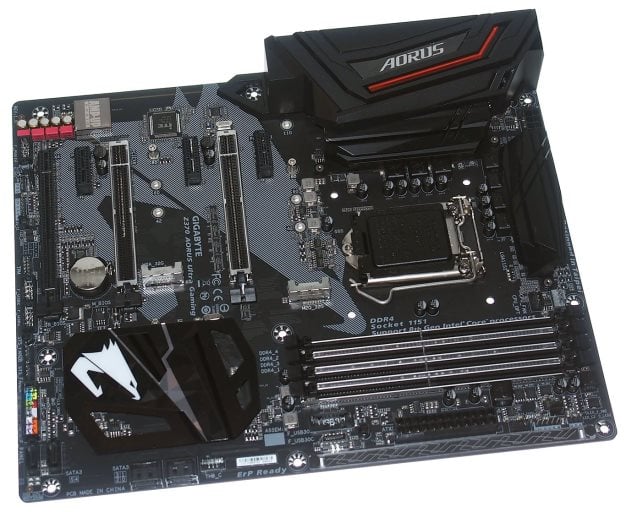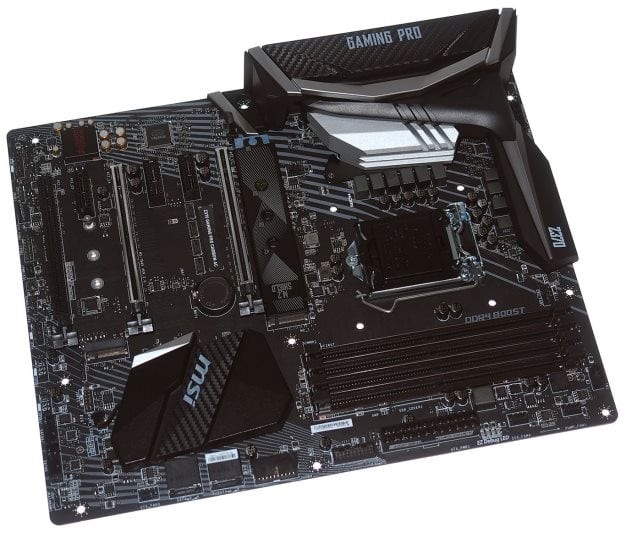Intel Core i7-8700K And Core i5-8400 Review: Coffee Lake - More Cores, Performance And Value
The high-level block diagram above gives a good visual representation of the Z370 chipset’s main features. Like the previous-gen Z270 (and a few generations to come before it), the new Z370 chipset is essentially an I/O hub, as all of the traditional functionality previously found in a Northbridge chip has been integrated into the processor itself. Some of the new features include official support for faster DDR4 memory, up to 24 additional PCIe lanes (over and above the 16 lanes build into the processors), Intel Platform Trust Technology, XTU and Optane memory support. USB 3.1 Gen 1 is native to the chipset (up to 10 ports) and there are up to 14 USB 2.0 ports available, along with 6 SATA ports.
For the purposes of this article, we got our hands on a pair of Z370 based motherboards, one from Gigabyte and one from MSI. The boards we’ll be showing you here include the mainstream Gigabyte Aorus Z370 Ultra Gaming and the MSI Z370 Gaming Pro Carbon AC. On the pages head, we have full sets of numbers from the Aorus Z370 Ultra Gaming, but time constraints prevented us from running numbers on the MSI board – rest assured, its performance is similar though it is packing a slew of additional features.
Gigabyte has a handful of Z370-based motherboards about to hit. The Aorus Z370 Ultra Gaming we’ll be showing you here isn’t the company’s flagship product, but it is still packing a wealth of integrated goodies including ALC1220-based audio with a 120dB SNR, a headphone amp, configurable RBG lighting with swappable overlays for accent LEDs, server-class digital power circuitry, beefy coolers, multiple M.2 slots, and all the features offered by Intel's chipset itself.
As we’ve mentioned in the past, Gigabyte is now using the “Aorus” name with its gaming-grade motherboards. All Aorus-branded motherboards feature a newly refreshed user interface for their BIOS, with “Smart Fan 5” – the latest iteration of Gigabyte’s fine-grained fan controls that give users the ability to tune their cooling using sensor data from multiple areas around the board.
We should also mention that Aorus boards have hybrid fan pin headers too, that can auto-sense what type of fan or device is plugged into the header and tune settings accordingly. For example, the headers can differentiate between a water pump and high-speed, PWM fan, and they support up to 3 amps per-header with built-in overcurrent protection.
Aorus gaming motherboards like the Z370 Ultra Gaming are also outfitted with fully-customizable RGB lighting across a few segments of the PCB (for example, around the PEG slots and on the chipset cooler). The lighting can be configured via Gigabyte's “RBG Fusion” app for different modes (pulsing, color cycling, etc. -- 10 modes in total) and there are additional headers on the board for adding more LED light strips as well; the board supports up to 300 LEDs in total.
The Gigabyte Aorus Z370 Ultra Gaming’s audio comes by way of a Realtek ALC1220 codec, with high-end WIMA caps and isolation circuitry to optimize sound quality. The board is also packing an Intel Gigabit network controller, support for SLI and CrossFire, and it even has a PS/2 mouse/keyboard port. That’s probably not a big deal to many of you, but if you want true N-Key rollover with USB HID driver hacks, PS/2 is the way to go.
The Aorus Z370 Ultra Gaming also features dual M.2 ports, 6 SATA ports (with support for RAID), USB 3.1 gen 1 (Intel) and gen 2 (ASMedia), with a Type-C connector on the back, and all of the I/O you’d expect from a high-end board. The BIOS is loaded with overclocker friendly features as well, and its accessory bundle is decent, albeit a bit spartan. The Gigabyte Aorus Z370 Ultra Gaming includes a handful of SATA cables, a custom I/O shield, a user’s manual and installation guide, drivers and utility software, an Aorus case badge, and some easy case connectors to simplify installation.
Next up is the MSI Z370 Gaming Pro Carbon AC. Like most other Z370-based motherboards, the Z370 Gaming Pro Carbon AC leverages all of the chipset’s inherent features, but MSI definitely kicks things up a few notches and puts their own spin on things. The Z370 Gaming Pro Carbon AC, for example, has customizable RGB LED lighting that can be extended with additional lighting strips along with metal reinforcements on its M.2 and expansion and DIMM slots, for added strength and rigidity.
As you’d expect in an enthusiast motherboard from this generation, the MSI Z370 Gaming Pro Carbon AC also features a mouse-friendly BIOS / UEFI that’s quick and easy to navigate, offering an extensive array of overclocking and performance-related options. MSI calls it their Click BIOS 5, and it sports everything from high resolution fonts to the latest version of MSI’s hardware monitor functionality. The Z370 Gaming Pro Carbon AC also features some highly-durable Titanium chokes, in addition to high-conductivity polymer and / or solid capacitors throughout, to improve long-term reliability and overall efficiency. The board is outfitted with an all-digital PWM as well, to further improve power efficiency and smooth delivery.
The MSI Z370 Gaming Pro Carbon AC also offers easy overclocking by way of its OC Genie and Game Boost features, but the UEFI sports all of the overclocker-friendly tools we’ve come to expect from MSI for manual tweaking as well. The fan controls on the board are also very robust and MSI has put in additional effort to isolate and shield the memory circuitry to ensure clean signaling and the highest possible overclocks.
Other features of the Z370 Gaming Pro Carbon AC include USB 3.1 Gen 2 type-C and type-A ports for quick-charging and straightforward connectivity of the latest mobile devices, Intel powered gigabit networking with built in 15kV surge protection, CrossFire / SLI support, and a shielded M.2 slot.
In addition to the aforementioned items, we should point out that the MSI Z370 Gaming Pro Carbon AC offers 8-channel audio but way of a Realtek ALC1220 codec with Nahimic 2+ Audio Enhancer support and MSI’s Audio Boost 3. Audio Boost 3 incorporates dual OPA1652 AMPs, gold-plated audio jacks, EMI shielding, and high-quality audio filtering caps designed to enhance the quality of the audio output on the board.
We found the layout of the Z370 Gaming Pro Carbon AC to be good and also really like the dark red, black, and carbon-fiber features on the board. Your tastes may vary, of course, but we think this is one heck of a good looking motherboard. There is also plenty of I/O on the board, including a PS2 port like the Gigabyte offering above.
Included with the MSI Z370 Gaming Pro Carbon AC you’ll find a wide array of accessories, like the 802.11ac Wi-Fi add-in card (with antenna), an array of cables, a rigid SLI bridge, custom I/O shield, driver disc, an assortment of documentation, and some handy labels meant for all of the assorted ports and headers on the board.













